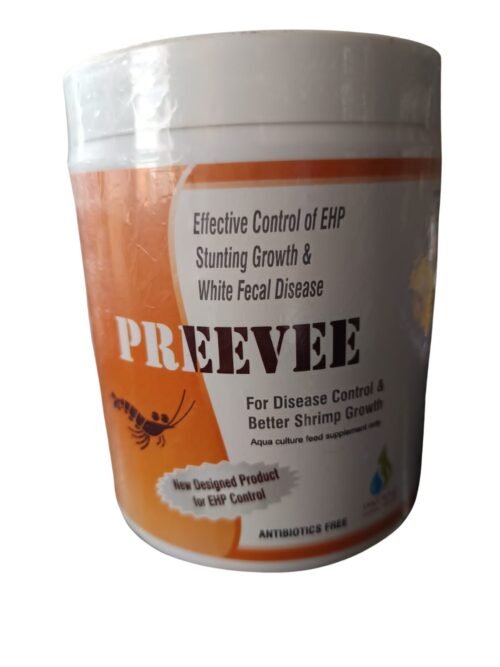Discount up to 35% for first purchase only this month.
- Home
- White Gut/White Fecal
- Prevee – 500gm
Prevee – 500gm
0 review
★★★★★ 5/5
₹2,170.00 Original price was: ₹2,170.00.₹1,345.40Current price is: ₹1,345.40.
Stunning growth promoter
IMKURAQ ANIMAL HEALTH PVT.LTD
Category White Gut/White Fecal
Preevee
EHP Management
PREEVEE, EHP ASSOCIATED STUNNING GROWTH & WHITE FECAL DISEASE CONTROL, Feed Supplement
Highlights:
Silver nanoparticle & herbal active principles to prevent viral, protozoan and bacterial diseases
Photochemical microbial products based immunostimulants
Quorum sensing breakers
Intestinal microvilli growth promoters
Nanoceuticals based enhanced micro-minerals and vitamins absorption
Nano-emulsifiers & herbal binders
Herbal and microbial immunostimulants
Feed-attractants and appetite stimulators
Natural phytochemicals, polyphenols and other herbal active principle
Immunostimulants to fight infections
Nano-emulsion to deliver active constituents
Attractants and appetite stimulators for high feed intake
Herbal binders for delivery of active constituents without loss in water
Natural, effective & safe to use
Description
The hepatopancreatic microsporidian Enterocytozoon hepatopenaei (EHP) is an emerging pathogen that affects cultured shrimp Penaeus vannamei. The microsporidium EHP, is probably the most important disease in shrimp farming at the moment. The main clinical signs of EHP are growth retardation, which leads to increased size variability. In advanced stages of the disease, EHP-infected shrimp typically display soft shells, and chronic mortalities. In some cases, the coinfection of EHP and Vibrio spp. has been associated with the development of white faeces syndrome (WFS). Histopathological lesions induced by EHP in the hepatopancreas display irregular/regular basophilic inclusion bodies within the cytoplasm, with or without the presence of spores. Acute Hepatopancreas Necrosis Disease (AHPND) also known as Early Mortality Syndrome (EMS) began causing significant, farmed shrimp mortalities and production losses. The strong association found between cases of septic hepatopancreatic necrosis (SHPN) and EHP suggests that EHP increases shrimp susceptibility to infection by Vibrio bacteria – known opportunistic pathogens that cause disease when shrimp health is compromised. EHP infection disrupts the cells of the hepatopancreas tubules and allows Vibrio spp. Controlling Enterocytozoon hepatopenaei (EHP), a microsporidian parasite affecting shrimp, is challenging due to its resilience and persistence in shrimp farms. Natural compounds like essential oils and plant-based bioactives are being explored for their potential antimicrobial, anti-parasitic, and immune-boosting effects. Compounds like cinnamaldehyde, citral A, thymol, carvacrol, tea tree oil, menthol, camphor, oleuropein, liquorice, eucalyptus oil, and curcumin exhibit various antimicrobial and anti-parasitic properties that may help in managing EHP infections. By combining them in carefully managed doses, shrimp farms can enhance resilience against EHP while promoting sustainable and eco-friendly practices in aquaculture.
Our innovative formulation comprising of silver nanoparticle, Copper Nanoparticle, Selenium Nanoparticle and Chromium Nanoparticles and unique herbal purified active compounds cocktails helped to control further multiplication of EHP and regain the growth of hepatopancreas as well as shrimp. This feed additive helps to control size variation of shrimp and excel growth back to normal. Approach to control using plant essential oils and nanotechnology to control EHP and related symptoms have provided new look of disease control. Associated symptoms of the disease can also be improved with different fatty acids, phospholipids, chelated minerals and antioxidants. This helps to control viral, bacterial and associated other infectious agents and help to improve productivity. In addition, chelated minerals, vitamins and growth promotors helps to improve recovery from disease.
Be the first to review “Prevee – 500gm” Cancel reply
Related products
-
White Gut/White Fecal
WF SHEILD -1KG
Rated 0 out of 5₹1,999.00Original price was: ₹1,999.00.₹1,239.38Current price is: ₹1,239.38. -
White Gut/White Fecal
Pro-G
Rated 0 out of 5₹2,970.00Original price was: ₹2,970.00.₹1,841.40Current price is: ₹1,841.40. -
White Gut/White Fecal
Nivaran-WF (1L)
Rated 0 out of 5₹2,499.00Original price was: ₹2,499.00.₹1,549.38Current price is: ₹1,549.38.









Reviews
There are no reviews yet.